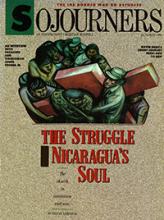Someday in the far-distant future, some 23rd-century Mel Brooks may make a satirical film called The History of the World: Part MCXXXXVII. If so, Ayatollah Khomeini, Grand Poohbah of the Islamic Republic of Iran, will have to figure prominently as one of history's most laughable characters.
It's possible, you know. In his real-life, late-'70s opus The History of the World: Part II, the present-day Brooks managed to get a laugh out of the Inquisition. Really. I saw it. It was the funniest bit in the movie.
If such a satire is ever made, Khomeini's $5 million bounty on the head of novelist Salman Rushdie, author of the controversial book The Satanic Verses, will no doubt serve as its farcical centerpiece. But this mini-inquisition may be a little too close for parodic comfort.
There is too much blood lust in the air. Rushdie still lives. But that could easily change tomorrow. So, taking the threat seriously, for now, here are a few things that the Rushdie affair suggests about our modern, and post-modern, world.
First and foremost, it suggests that if five billion wildly diverse and cantankerous human beings are going to knock around on this planet together sharing the same communications satellites, then that quaint, old "Western bourgeois" ideal of free expression must become universal. That may seem self-evident. But a strong case can be made that such a bald pronouncement smacks of cultural imperialism.
Cultural imperialism is a real and debilitating fact of the post-colonialist world. It's the dehumanizing process by which the West has imposed its norms, values, and modes of thought onto the rest of the world as instruments of domination. And the Islamic world has been cruelly victimized by cultural imperialism for centuries. That's what the Iranian revolution of 1979 was largely about.
Read the Full Article

